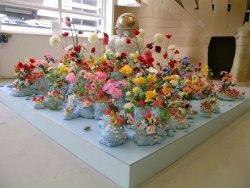Alive and clicking The Guardian

Heath Bunting, the first internet artist, showed me his piece A Visitors Guide to London at an underground arts event in the early 1990s. By clicking on a dustbin or a bit of waste ground, you could take a magical mystery tour of the metropolis. It was primitive, innocent, and infused with a radical optimism. Bunting was one of a generation of young activist-artists for whom the digital revolution was a superhighway to world anarchy.
They are still at it, only now it's the commercial structure of the internet they are trying to subvert - one project recently commissioned by the new media art site rhizome.com is called Google Will Eat Itself; the creators propose to buy bits of Google until they own the entire business. Such artists now seem a bit old-fashioned. The internet is no longer a utopian possibility but an ever-mutating reality; the hacker has been replaced by conventional artists who simply want to show their work online. And the man who has been first to tap into this desire and produce the art equivalent of YouTube is Charles Saatchi, whose reputation as a businessman and collector could scarcely be more different from Heath Bunting's lo-fi activism.
This summer, the Guardian teamed up with Saatchi's Your Gallery site in the hope of creating an actual, as opposed to virtual, exhibition, drawn from the the unwieldy mass of photographers, sculptors and painters on the site. It was hard to know where to start, but a judging panel - me, artists Cornelia Parker and Marc Quinn, gallerist Mollie Dent-Brocklehurst and broadcaster Tim Marlow - eventually drew up a shortlist of 30. Then we asked readers to nominate their top 10: the work of these finalists goes on show at the Guardian's Newsroom gallery next week. Your Gallery is typical of the new face of the internet: it does not claim any political or utopian dimension, yet delivers the interaction dreamed of by the first cyber-idealists.
The technology has caught up with the dreams. The invention of the printing press in the 15th century is a good analogy. Printing immediately transformed how art was seen. People throughout Europe could and did see Michelangelo's Sistine ceiling through prints. Yet this only enhanced the demand to see the original, as photography and film stimulate tourism today.
In his famous essay The Work of Art in the Age of Mechanical Reproduction, Walter Benjamin wrote that photographic reproduction would destroy the "aura" of the original work of art. In reality, masterpieces - even the "originals" of Duchamp's Readymades - have become ever more glamorous. The success of Your Gallery proves once again that people do not want to abandon the physical work of art, only find new ways to communicate it.
The Guardian has now helped Saatchi complete the circle and return the objects from his virtual gallery to a flesh and blood exhibition. Far from a betrayal of the non-physical nature of internet art, this is exactly what the artists who contribute work to Your Gallery want - to be seen. It is also a dramatic revelation of how, in the near future, this way of showing art may undermine the entire system of dealers, magazines and art fairs that calls itself the "art world".
There are no quality controls or limits on who posts art at Your Gallery, any more than there are controls on who posts a comment on a blog at the Guardian's Comment is Free website. The same democratic revolution that is transforming journalism promises to transform art. The 10 artists who have made it out of Your Gallery into the Newsroom are a hugely varied and debatable bunch, but what they have in common is that none of them have so far been picked up by the art world.
Art criticism is one of the things that has to change in a more democratic culture - as I quickly discovered when I joined the judging panel, a virtual, rather than face-to-face, process. Three of my picks made it into the final 10, and these are still my favourites - especially the nutty and grotesque art of Joshua Hagler, an anthropological window on to America's religious right - but what does getting them into the final 10 mean? Is this collective choice "the truth"? No, it's democracy. It does reflect a kind of consensus, but part of democracy is that you have the right to disagree totally.

0 Comments:
Post a Comment
<< Home